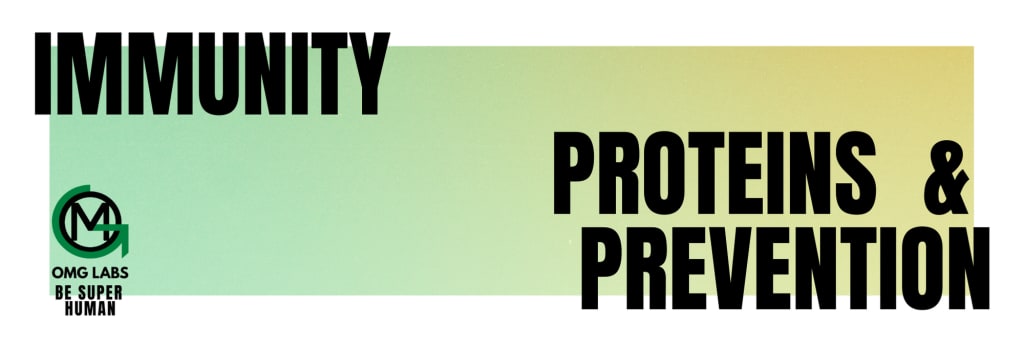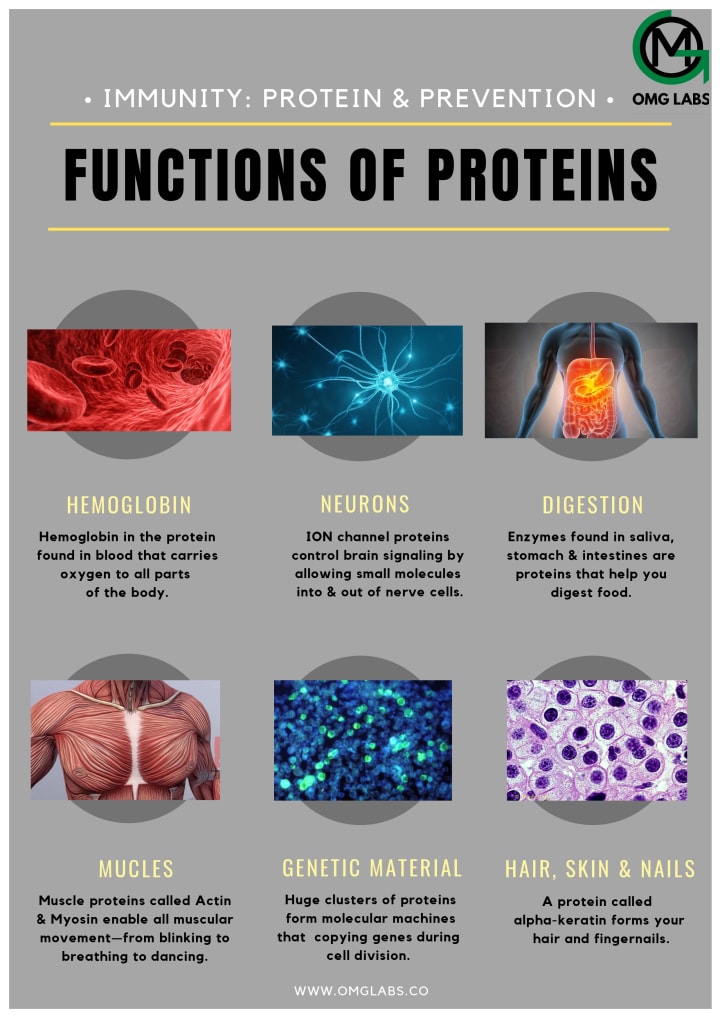Role of protein in Immunity: The need of the hour
Biology taught us that proper nourishment keeps our body healthy- growing, insulated and safe from diseases

By now we would all agree that 2020 turned out to be- quite a plot twist.
This year Covid-19 was the Viral sensation. Quite literally.
Slogans such as “Stay safe, stay indoors, wear a mask and use sanitizers” have become the new norm. While precautions are necessary, the most important protective gear we can wear today is our body’s inbuilt: Immune system.
Biology taught us that proper nourishment keeps our body healthy- growing, insulated and safe from diseases. The variety of complex functions that keep our systems up, start with what we eat. Today, we are pushed to be more mindful of our eating habits and take effective action to maintain a fully functioning defense system.
As we may know, Proteins are found in different forms throughout our body. Just as everyday objects are designed to serve a specific function (eg: the shape of a funnel, the depressions in an egg tray or even shoe laces) proteins come in distinct shapes and sizes.
Proteins are like long necklaces made of different beads called amino acids.
There are 20 different amino acids, each with its own shape, size and properties to carry out their designated roles in specific bodily functions. Every protein has its own sequence of amino acids, typically 50-2000 hooked end-to-end in many combinations.
These amino acid chains don’t remain straight and orderly. They twist, buckle and fold upon themselves while the knobs of some amino acids groove into each other. In order to become active, proteins must twist and fold into their final or “native” conformation after being created. Proteins fold within seconds of being made. Most of them require assistance from other proteins called Chaperones for efficient folding.
Out of the 20 of amino acids, 11 are synthesized by the body: Non Essential Amino acids
and 9 must be obtained through nutrition.
Non- essential Amino Acids
Essential Amino Acids
Alanine Histadine
Arginine Isoleucine*
Asparagine Leucine *
Aspartate Lysine
Cystine Methionine
Glutamic Phenylalanine
Glycine Threonine
Ornithine Tryptophan
Proline Valine*
Serine
Tyrosine *Branded-chain-amino-acids (BCAAs)
Role of protein in Immunity: How do they work?
Now that we know a bit more about proteins in our diet, to make use of them, our bodies must digest it to a usable form. The digestive process of protein occurs in the stomach and small intestine using gastric juices, digestive enzymes and hormones. The goal of protein digestion is to work backwards. First the protein is unfolded followed by separation of amino acids from the chain in preparation for absorption into the bloodstream.
Gastric juices in our stomach consist of: Hydrochloric acid and inactive pepsinogen (secreted by the inner lining of the stomach). The acid relaxes and unfolds the protein along with providing the required acidic medium to convert inactive pepsinogen to active pepsin. Once the protein is unfolded, pepsin can break it down into smaller chains. It is passed down to the small intestine for digestion where the acidic medium is neutralized.
The digestion in the small intestine continues with the secretion of several enzymes. Endopeptidases break down the protein chain furthermore, exopeptidases clip off single amino acids from either end of the protein fragment. The enzymes target a specific amino acid eg: Trypsin releases the bond between Lysine or Arginine to another amino acid.
Once the single amino acids are separated, they are absorbed into the bloodstream.
Our hormones play a vital in facilitating the digestion process. Stimulus from our external senses (eg: sight or smell of food) set off a chain reaction of hormones, enzyme and fluids that aid in preparation of digestion, the process and absorption of digested nutrients by the body.
Role of protein in Immunity: Specific roles and biochemistry of proteins
As seen from the infographic above, Proteins are found in so many different places in our body, highlighting their importance and how we must balance deficiencies in order to keep up the most basic life sustaining body functions.
A variety of different protein work together in the following ways:
1. Production of body cells and tissue development is a key role of proteins. Our circulatory system is a key part of our immunity which contains Essential antibodies that are protein component of blood and act as barricades to the disease/ illness.
2. Branded chain amino acids (“Branched-chain” refers to the chemical structure of BCAAs), which are found in protein-rich foods such as eggs, meat and dairy products are key components in immune function. Insufficient availability of BCAAs prevents protein synthesis and inhibition of apoptosis (Programmed cell-death in growth function regulated by the body) optimally, therefore hindering an optimal immune response from being mounted.
BCAAs consist of three essential amino acids:
• Leucine
• Isoleucine
• Valine
BCAAs have a direct function in fuelling the cells of the immune system: regulation of T-lymphocytes proliferation, protein synthesis, activation of microphages function and inhibition of apoptosis.
3. Complementary proteins are essential proteins that help in forming a chain reaction to fight off the illness causing cells and remove it from the blood stream all together - like a cleaning and disposal process.
4. Wound Healing requires additional amounts of proteins and amino acids- the absence of which delays the healing process and time taken. This is why protein is often recommended by physicians for the victims of burns or surgery patients to speed up the recovery process.
• WHEY protein is distinctly different from other proteins when it comes to immunity: it boosts glutathione production in some tissues. Glutathione is the pivotal point of the antioxidant defence system in the human body.
5. Antibodies that fight off infections in our blood stream (Leucocytes) are activated by Alanine to carry out their functions. Arginine works with signaling molecules, fighting of pathogens, release of cytokines and also work as a mediator of auto-immune diseases.
6. Many amino acids are neurotransmitters (Tyrosine, Tryptophan), vasodilators, aid in synthesis of proteins required to power intestinal immune function. They make up Antioxidants (Glycine, Tryptophan), anti viral, anti-tumor and anti-inflammatory components in our body further affirming their importance in our body.
Role of protein in Immunity: Conclusion
The role of proteins via amino acids is so vast and intricate in various aspect of the body. They are responsible for a wide range of functions from Immunity to forming integral parts of genetic coding. Particularly their role in immune function are so intricate that covering any nutritional deficiencies is imperative to survival.
Protein supplements can be used to effectively cover deficiencies from everyday diets to ensure the above mentioned functions of proteins are expressed in the optimum amounts.
Understanding and educating ourselves about the functions of the body and immune system is the first step towards taking relevant actions to improve our immunity in the time of a global pandemic. Highly nutritional diets along with exercise and rest needs to replace purely compulsive and fear driven precautionary measures stemming from anxiety. These responses could aggravate auto-immune functions and ironically make us fall into ill-health caused by misinformation.
The real meaning of stay fit, stay safe and stay healthy has to start from informed choices and effective actionable regimes, so that we can fight this together today, for a genuinely stronger tomorrow.






Comments
There are no comments for this story
Be the first to respond and start the conversation.